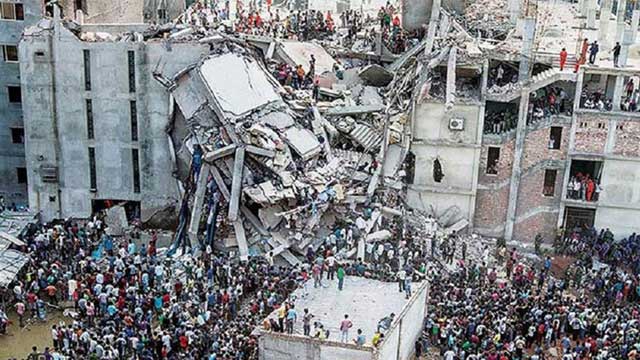The trial in the murder case filed over the Rana Plaza collapse, which killed 1,138 people, mostly apparel workers, and injured over 2,400 at Savar on April 24, 2013, is making very slow progress.
Officials said that only one out of 594 witnesses has been examined in the past six years since the charges were framed against 41 accused in July 2016 in the murder case.
Dhaka District and Session Court’s acting public prosecutor Bimal Samadder told New Age that the trial in the sensitive case could not be started for years as some accused secured stay orders from the High Court.
Finally, in January this year, the court started recording the testimony keeping one accused aside as a stay order was still in place for trial against one accused while the court has already vacated seven stay orders.
The High Court on different dates stayed proceedings against eight accused—former Savar municipal mayor Refatullah, former municipality councillor Mohammad Ali, Abul Hossain, Shahidul Islam, Yusuf Ali, Abdus Samad, Jamsedur Rahman and Belayet Hossain.
Stay order remained in place for the trial against Refatullah while the court vacated the other stay orders, said prosecutor Bimal Samadder.
Bimal added that the attorney general had been requested to take steps to get the stay on trial against Refatullah vacated.
Since the trial started on January 31, the court could examine only one witness, a sub-inspector of Savar police station Wali Ashraf, also the plaintiff of the case. The court set May 29 for the next hearing in the case.
‘I hope the case will go fast once all stay orders are vacated,’ said prosecutor Bimal.
Meanwhile, no disposal was made over a public interest litigation writ petition filed over the Rana Plaza collapse that sought guidelines from High Court for proper compensation to the victims.
The petition, filed jointly by Bangladesh Legal Aid and Services Trust and several human rights organisations in April 2013, also sought punishment of Rana Plaza owner Sohel Rana and the owners of five factories that the building housed.
A committee headed by General Officer Commanding of the Nine Infantry Division of the Bangladesh Army stationed in Savar, formed following a suo moto order issued by the bench on April 30, 2013, submitted its report to the registrar’s office on January 23, 2014 with 16 recommendations on compensations to Rana Plaza victims.
The committee proposed the highest Tk 14.51 lakh for each of the workers who died or went missing or became permanently disabled and the lowest Tk 1.5 lakh as compensation for victims.
The High Court’s online cause-list shows that a hearing in the case relating to compensation in the Rana Plaza collapse was not held since July 23, 2014.
Another writ petition relating to the prosecution of Tazreen Fashions factory’s Md Delwar Hossain and ensuring proper compensation to fire victims was filed by anthropologists Nanin Akter Banu, Saydia Gulrukh Kamal and Mahmudul Hasan Sumon in May 2013.
Lawyers of both the writ petitions told New Age that the two matters did not appear in the list of hearings by another bench since the previous benches were not functional.
BLAST’s lawyer Sara Hossain said that an order was passed by the then chief justice SK Sinha for analogous hearing (hearing same type of cases together) of both Rana Plaza and Tazreen matters by the bench, led by Justice Mirza Hussain Haider.
But the hearing was not held as Justice Mirza Hussain Haider was elevated to the Appellate Division.
Amid the delay in the trial, Rana Plaza survivors and relatives of the victims all but lost their hopes of getting justice.
Saddam Hossain, a survivor of the incident, said that he was waiting for justice like other victims but his hopes faded after nine years of waiting.
He said that while the accused were enjoying normal life after getting bail, survivors were passing a painful life with injury and financial constraints.
A recent survey conducted by ActionAid Bangladesh among 200 survivors of the Rana Plaza collapse found the health conditions of 56.5 per cent of survivors deteriorated over the time while 48.5 per cent were still suffering from trauma even after nine years of the incident.
Labour leaders said the trial in the Rana Plaza murder case was delayed because the accused are influential people.
‘Government is also not sincere enough about the trial,’ former secretary general of IndustriALL Bangladesh Council Salauddin Shapon said.
The court on July 18, 2016 framed charges against 41 people, including owners of five factories, local government representatives, administration officers and political activists in the homicide case after the collapse of the Rana Plaza building.
The trial started against 37 people as three accused – Rana’s father Abdul Khaleque, Abu Bakar Siddique and Abul Hossain – died while HC stayed the trial against Refatullah.
Among the 37 accused facing trial only Sohel Rana is in custody, 30 secured bails and six remained absconding.
Sohel Rana, his parents and five apparel factory owners have been named in the 14 cases, including 11 filed with the Labour Court.
Victims Mahmudul Hasan Ridoy, Nasir, Nilufa, Pakhi and Roksana urged the government to ensure exemplary punishment of the accused that brought untold suffering to them.
No witness testimony was held in the cases, said BLAST’s labour court advocate Sifat E Nur Khanam, adding that the court set the next date of hearing in May.
More than four million workers, mostly female, work for at least 4,000 garment factories located in several industrial belts across Bangladesh.





